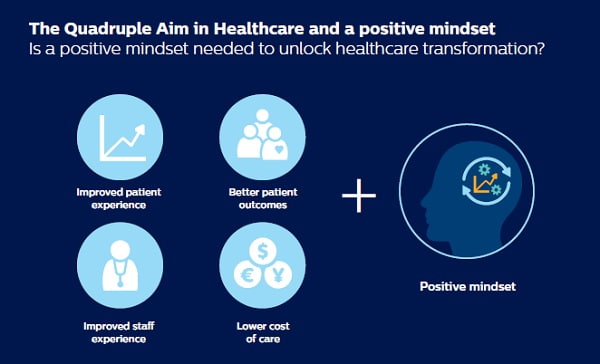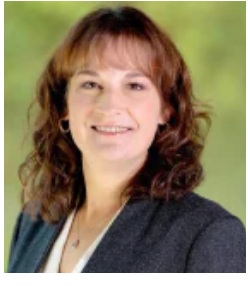Why Hospital Operations innovation has never been more important and how small mindset changes can have a big impact
A passionate advocate of positive partnerships and purposeful business, Dawn Bruce is Services & Solutions Delivery Lead for Philips. An originator of the Operational Intelligence approach and backer of people-powered progress and soft skills, she has extensive experience of outcomes-driven business transformation and healthcare system change management.
“There are two main mindsets we can navigate life with: growth and fixed. Having a growth mindset is essential for success. It’s also key to transformation and so if we want to transform healthcare, we need to look at our individual mindsets, their role in our motivation and self-regulation, and their impact on achievement and interpersonal processes.”
Dawn Bruce, Services & Solutions Delivery Lead, Philips
Transformation is a term that is synonymous with healthcare and yet all too often the mere mention of word strikes fear in our hearts. Fear that healthcare is so complex and fragmented that we’ve failed at change before we’ve even started, or perhaps fear because the solution is so often outsourced to technology and ignores the fact that value-based transformation, while enabled by process and technology, can only be enabled by an intangible and inconsistent element: people.
Strategies are lofty, solutions are many and yet few discussions around the pursuit of successful healthcare transformation pay more than lip service then to the psychology of its key players and the importance of believing that change is possible.
A pioneer in the importance of believing that improvement is possible, American psychologist and professor at Stanford University, Carol Dweck[1] found that humans approach a challenge with either a fixed or a growth mindset. In a fixed mindset we believe our talents and abilities are fixed, we are who we are. In a growth mindset, by contrast, we believe there is always room for improvement. In a fixed mindset, feedback about suboptimal professional performance is threatening as it confronts ourselves with our own shortcomings. In a growth mindset, feedback is a gift, as it helps us to further develop.
Recent advances in neuroscience go even further, revealing that the brain is far more malleable than we ever knew. Research into brain plasticity[2] has shown how connectivity between neurons can change with experience. With practice, neural networks grow new connections, strengthen existing ones, and build insulation that speeds transmission of impulses. These neuroscientific discoveries have shown that we can increase our neural growth by the actions we take, such as using good strategies, asking questions, practicing, and following good nutrition and sleep habits.
At the same time that these neuroscientific discoveries have been gaining traction, researchers have also started to explore and better understand the link between mindsets and achievement. It turns out, if you believe your brain can grow, you behave differently. This supposition has resulted in numerous interventions and studies that prove that we can indeed change a person’s mindset from fixed to growth, and when we do, it leads to increased motivation and achievement[3].
Healthcare transformation is perhaps the ultimate mindset challenge; an industry where complex change is required and yet even the best hospitals have a work culture that is populated with setbacks, challenges and hierarchy and constraints.
As the Harvard Business Review has reported in its article, ‘Positive intelligence’, “research shows that when people work with a positive mind-set, performance on nearly every level – productivity, creativity, engagement – improves.” New research from MIT also bears this out. In fact, breakthrough research by a team at MIT’s Picower Institute for Learning and Memory has documented one type of environmental feedback that triggers plasticity: success. Equally important and somewhat surprising: its opposite, failure, has no impact.
Is a positive mindset, then, perhaps a missing factor in achieving the Quadruple Aim in healthcare? And, if so, how do we unlock the growth mindset of healthcare transformation?
Dawn Bruce, Services & Solutions Delivery Lead for Philips believes that a great place to start is in Operations, the backbone but also the brain of a hospital and where a range of departments and disciplines come together and where strategic and structural change can be most effective.
In fact, Operations, she believes, has the ability to be the driver of change if it can build the new capabilities and behaviors that modern healthcare needs. Not only does it enable new, integrated ways of working, it also has the potential to enable its disparate workforce to believe that change is possible but also to have the resilience to realise it. This is especially vital since research indicates that resilience, originally studied in young children suffering major traumatic events, is an essential quality in healthcare and that for an environment to facilitate resilience it needs to be both high in challenge and support.
It’s a quality that has never been more in demand within long term teams, facing unprecedented challenges, such as those presented by the COVID-19 global pandemic, as Dr Helen McGill, Medical Director and Responsible Officers, NHS Professionals, has recognized stating: “Resilience is needed in the NHS now more than ever – at an individual, organisational and systemic level. We all need to work together to prepare for, respond to and adapt to both ongoing change and major unexpected disruptions. This is not just about surviving, it’s about minimising crises and identifying improvements, both personally and professionally[4].”
Dawn Bruce also believes that unlocking a growth mindset offers opportunities for innovating procurement and governance as well as developing future-fit healthcare training that will attract and retain a millennial worker.
For more insights into unlocking the growth mindset for healthcare, read Dawn Bruce’s follow up article in the next issue or visit www.philips.com/Operational-Intelligence
References:
[1] Mindset: The new psychology of success, Dr. Carol S. Dweck Ph.D, 2007
[2] Positive intelligence, Harvard Business Review, https://hbr.org/2012/01/positive-intelligence
[3] Success gets in your head – and changes it, Harvard Business Review https://hbr.org/2010/01/success-gets-into-your-head-and-changes-it
[4] The importance of resilience in the NHS right now, Dr Helen McGill, Medical Director and Responsible Officers, NHS Profession, https://www.nhsprofessionals.nhs.uk/en/joining-nhsp/latest-news/detail?Id=the-importance-of-resilience-in-the-nhs-right-now




















